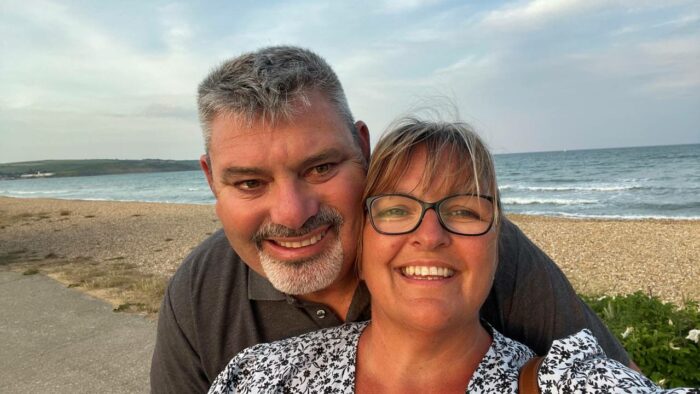Our client, a mother-of-one, was forced to give up her hobbies overnight after a surgical incision following an operation to remove an ovarian cyst split open, due to not being properly stitched together.
Timeline of events
At the age of 46, Karena McAlister underwent surgery to remove her ovaries at Bath’s Royal United Hospital in February 2017. However, her operation wound was not closed properly – leading to the stitches allegedly unravelling.
Despite heavy bleeding, the now-52-year-old was discharged, but continued blood loss and sickness meant she was rushed back to the hospital the following morning, where she underwent a second, emergency operation to re-stitch the surgical incision, which caused adhesions and has left her with lifelong chronic pain.
Three days after her operation, Ms McAlister was assessed as being fit for discharge. Her partner of 12 years, Gary Harvey, arrived at 2pm to take her home but upon seeing Ms McAlister, asked medics for the wound to be looked at due to heavy bleeding.
Four hours later, a nurse removed the dressing and said she would find someone to assess it. However, despite Mr Harvey repeatedly asking for the surgical incision to be re-dressed, Ms McAlister was left lying on the bed with an exposed wound for more than two hours, before being discharged at 9.30pm.
The following morning, Ms McAlister and Mr Harvey visited the GP due to continued sickness and worsening pain. She was rushed to A&E, where she was diagnosed with a midline wound dehiscence and underwent a second operation. An MRI scan three months later revealed that Ms McAlister had been left with scar tissue in her abdomen due to multiple operations and was referred to the chronic pain clinic for ongoing pain management.
Our client’s thoughts
Ms McAlister, of Wiltshire, said: “When I was discharged initially, the pain every time I moved was like a bread knife cutting through my lower left-hand side as if my insides were being ripped apart. Every moment felt like torture.
“It’s been a very long journey and I’m still not fully accepting of the way my life has changed and the years negligent surgery took away from me. I was very active beforehand – I used to go wakeboarding, cycling, swimming and running, but it all stopped overnight.
“Even simple things like hanging the washing out, changing the bedding and vacuuming – I can’t do them anymore due to the pain. We’ve had to make changes to our home and get a blow-up tent for when we go camping. While these things are now the norm, they took a lot of adjusting to.
“The day after my second surgery, I was told there’d be an investigation. I didn’t comprehend it at the time as I was just grateful the cyst had been removed. But when I saw the outcome was entirely incorrect, offensive and full of lies, all I wanted was an apology – not because the surgery had gone wrong, but because they had lied through an investigation I hadn’t asked for.
“They said the bleeding I suffered was light but, by sheer coincidence, I had photos that showed otherwise. Without those images, I wouldn’t be in the position I am in today. Suing the NHS isn’t something I am comfortable with and it’s not something I am proud of.
“However, remembering my son and my partner watching me in pain and feeling so helpless is something that will haunt me forever. I needed an apology and acknowledgement of what my family and I had gone through, and the way my life has changed forever.”
Mr Harvey said: “The ward let Karena down; the care she received was dreadful. They should never have discharged her so late at night when she was still bleeding and in pain. I’ll always blame myself for agreeing to take her home. She was in agony and it was obvious the stitching had come undone – you only needed to look at the wound.
“The NHS saved my son’s life shortly after he was born so criticising it is extremely difficult. However, the investigation post-operation was incorrect. If the hospital had just apologised at the time, that truly would have been sufficient. But they couldn’t acknowledge that the care was suboptimal and verging on neglect. As a result, Karena will have to suffer for the rest of her life.”


How we helped Karena’s case
We instructed a consultant obstetrician and gynaecologist to assess the standard of surgery. He relied on documents within the medical records, which supported a finding that the knot was tied insufficiently, which likely allowed it to unravel. The trust denied liability, suggesting the ‘knot snapped’. However, there was no evidence to support the assertion it had snapped and Lime Solicitors’ expert had never come across this in 30 years of practice.
Despite prolonged litigation, a settlement was achieved during a mediation hearing in April 2023, a few weeks before the scheduled trial. The trust subsequently provided a letter of apology to Ms McAlister.
A note from Viral Dagly
Viral Dagly, our medical negligence associate, who supported Ms McAlister throughout her claim, said: “Ultimately, all Ms McAlister wanted was for the trust to say sorry and to ensure learning from her own experience. She had very reasonable expectations for the claim, which should have settled far earlier than it did – avoiding the anguish of preparing for trial and significant legal costs.
“Our case found that the dehiscence was caused by substandard knot tying. Had the wound been sutured correctly, it would not have come undone, and Ms McAlister would not have suffered from such heavy bleeding and increased pain and vomiting. She would have made a full recovery within six to ten weeks. However, the negligence contributed to the development of significant adhesions, which is the cause of her lifelong and chronic abdominal pains.”
Ms McAlister added: “I can understand why people walk away from their claims. All the time, you’re trying to deal with your health, your family and your new life, and there’s a battle from the NHS that you shouldn’t have.
“That’s why I was so grateful for Viral – he kept me informed and shielded me from the NHS’ negativity. He’d give me advance warning of letters that were a hard read. There is no price you can pay for that type of support. He was genuinely acting in my best interests, and he made me feel human at a time when the NHS were trying to dehumanise me.”



